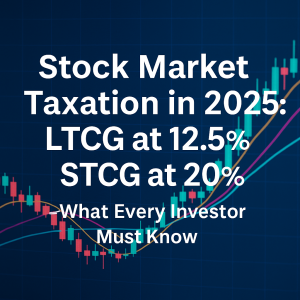The new income tax regime might look simpler, but what does it actually mean for your stock market returns?
Whether you’re an investor or intraday trader, understanding how taxes and transaction charges affect your net profit is critical to long-term success.
Let’s decode the real charges and tax impact under the new regime — with updated facts and 2025 examples.
1. What Is the New Tax Regime (2025 Snapshot)?
Introduced in 2020 and revamped in Budget 2023, the new tax regime offers lower income tax rates but without most exemptions and deductions.
As of FY 2025-26:
- It is now the default tax regime unless you opt for the old one.
- Capital gains tax rules remain the same under both regimes.
- But your net taxable income post trading/investing can affect which slab you fall into — and how much tax you pay.
So even though the capital gains tax isn’t different, the total taxes you pay might increase or decrease depending on your income mix.
2. Key Stock Market-Related Taxes You Should Know
| Type of Tax | Applicability | Rate (2025) |
|---|---|---|
| STT (Securities Transaction Tax) | On sale/purchase of securities | 0.1% on equity delivery, 0.025% intraday |
| Capital Gains Tax | On profit from asset sale | 20% (STCG), 12.5% (LTCG > ₹1L/year) |
| Dividend Income Tax | On dividend received | Taxed as per your slab rate |
| GST on Brokerage | On brokerage amount | 18% GST |
| Stamp Duty | On transaction value | Varies (0.015% delivery trades) |
Note: These are over and above your brokerage charges.
3. Impact of New Tax Regime on Traders & Investors
a) Intraday Traders & F&O Players
- You must declare profits/losses as business income.
- Under the new tax regime, no deductions (Section 80C, 80D, etc.) are allowed.
- Business expenses (like data charges, advisory fees) can still be claimed under Presumptive Taxation.
Pro Tip: Use ITR-3 or ITR-4 with audit requirements (if turnover > ₹10 crore or profit < 6%).
b) Long-Term Investors
- LTCG over ₹1.25 lakh/year is taxed at 12.5% (without indexation).
- STCG on equities held for <1 year = 20% flat.
No change under the new tax regime — but since slab benefits may differ, it may affect your overall post-tax returns.
4. Real Cost Breakdown of a Delivery Trade Example
Let’s say you buy stocks worth ₹1,00,000 and sell at ₹1,10,000.
| Charge Type | Amount |
|---|---|
| Brokerage (0.05%) | ₹50 |
| STT (0.1%) on Sell | ₹110 |
| Stamp Duty (0.015%) | ₹15 |
| GST on Brokerage (18%) | ₹9 |
| Exchange Transaction Charges | ₹3.5 |
| SEBI Charges | ₹0.6 |
| Total Charges | ₹187.1 |
| Profit After Charges | ₹9,812.9 |
| Tax (STCG @15%) | ₹1,962.5 |
| Final Net Profit | ₹7850.4 |
You earned ₹10,000 in profit, but took home only ₹7850.4
Example: LTCG on Stocks
Buy Price: ₹3,00,000
Sell Price (after 12+ months): ₹5,00,000
Gain: ₹2,00,000
Exemption: ₹1.25 lakh
Taxable LTCG: ₹75,000
Tax @ 12.5%: ₹9,375 (+4% cess)
Example: STCG on Stocks
Buy Price: ₹5,000
Sell Price (within 12 months): ₹8,000
STCG: ₹3,000
Tax @ 20%: ₹600 (+ cess)
Which Tax Slab to Use for Property/Gold?
If you bought the asset before July 23, 2024, you can choose:
- 12.5% flat without indexation
- OR 20% with indexation if it results in lower taxes
For assets acquired after July 23, only 12.5% applies.
Filing Tip: Split Your Gains!
When filing your ITR:
- Split LTCG and STCG before and after July 23
- Apply the respective old and new rates
- Keep detailed records (trade date, price, asset type)
Final Takeaways
- LTCG: Now 12.5% with ₹1.25L exemption
- STCG: Increased to 20%
- Property/Gold: Choose between 12.5% flat or 20% with indexation
- File carefully: Separate gains pre and post July 23
Disclaimer
Tax rules are subject to yearly changes. This post reflects the rules as of mid‑2025 based on official Budget 2024 notifications and updates up to Fiscal Year 2024‑25 (AY 2025‑26). Please consult a Chartered Accountant for personalized advice.
Open Demat account using:
- Upstox: https://upstox.onelink.me/0H1s/2QBH4Y
- Zerodha: https://zerodha.com/open-account?c=UI9061
- FundsIndia: https://www.fundsindia.com/registration/signup?referrer=14c986bdd27841eabe42ce2aaa37815b
Let me know in the comment box what do you think about the taxes on capital gains



